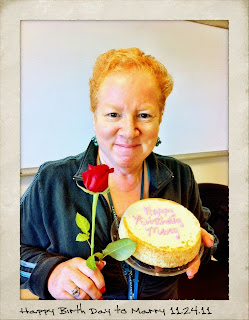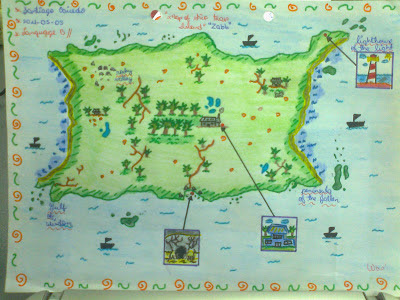Mary Goodman, "La Gringaquileña". An Interview (2).
(Continued from previous entry)
4. EFL learners always complain about the problems they encounter during the learning process. What recommendations can you give to all those students who do want to learn the language but feel discouraged sometimes.
Some students really want to learn English (while others are in class because they have to be there). In any case, it is easy to get discouraged when learning a new language, especially if a student doesn’t perceive a real need or urgency to learn the language. The spelling, pronunciation, punctuation, and grammar rules are difficult enough! Added to that is all the confusion surrounding vocabulary because words in English have various meanings and collocations. Likewise, there are homonyms/homophones/synonyms/antonyms and other fascinating items to learn (prefix/suffix/affix studies). Just when a student thinks he knows a lot, he/she takes a TOEFL or IELTS exam and then realizes s/he knows nothing about writing essays, or hasn’t mastered the ability to speak or communicate due to accuracy/fluency issues! Learning a language is extremely frustrating for most people, and English is right up there at the top of the list!
Of course, we need to encourage our students (Rome wasn’t built in a day! It takes a long time to learn a language well), and we need to keep their attention & interest. If we can engage them in activities that force them to use the language, that will motivate them a lot. (“Tell me, and I’ll forget. Show me, and I’ll remember. Involve me and I’ll learn.”). Here in the USA, I can take my students on field trips; for example, I take them to the senior citizen “home for the elderly” where my students engage them in conversation. I also like to take them to a local museum, such as the Science Museum of Ft. Lauderdale. Since that would be harder to do there in Ecuador, perhaps showing movies in English, teaching songs in English, and asking a “Guest speaker” (gringo/a) to come in and talk to the students might be motivating. Students could film the presentation and/or take notes (in English of course!).
5. One role that perhaps defines you more than anything is being an educator. Many would like to follow the same path and some little advice could be of help. What recommendations would you give to the future English teachers?
Wow….my advice to future English teachers? I’d tell them to have a lot of patience, be flexible, and find interesting ways to teach the same thing because sometimes you have to explain/ show something many times in many ways until a student finally “gets it”! I think I’ve explained “the Present Perfect Tense” about 1,000 times in 30 + years; however, I never get tired of teaching it, and I teach it in many ways- Via songs, games, board games, visuals, cartoons/ comics, jokes, newspaper articles, etc. Eventually, if you present it enough times and in enough ways, they (hopefully) will “get it”. Some will catch on faster than others; that’s a “given” because some students are better at languages and others are better at math/science. However, with a lot of patience, variety of methodology, EQ/ positive attitude, and classroom management techniques, the goal of language learning is achievable. Remember the old adage, “Everyone can learn and succeed, but not on the same day, nor in the same way”.




Comments